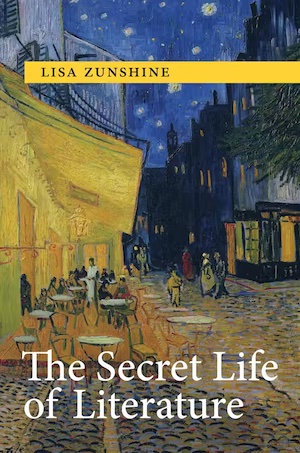By Suzanne Keen
Let’s begin with some illustrations of ordinary mind-reading—not telepathy or Vulcan mind-melds, but a pattern that emerges from our human ability to infer other people’s unobservable mental states: the motives, thoughts, wishes, and understandings that inform their behavior. Here goes: “In writing this review, I believe1 that the author Lisa Zunshine is likely to be interested2 in what I think3 about her book.” (Note that I could be wrong: Zunshine could be loftily indifferent to my views.) Here’s a more complicated example: “In formulating this review, I believe1 that you want2 advice from me about The Secret Life of Literature, so you can decide3 whether to read it, but I also know1 that you know2 that I will never know3 whether or not you decide4 after all to read it.” As I count the nested levels, indicated in superscript, my first example has third-level embedment and my second one stretches to a fourth level. Imitating Zunshine, I have italicized so you can visualize the levels of embedment, representing complexities of recursive intention-reading that we routinely track without even knowing that we are doing it. Our everyday lack of awareness of this mind-reading habit carries over to our literary reading, where complex embedment on the third level is ubiquitous. As Zunshine puts it, far from trumpeting her discovery, “when it comes to a work of fiction written within the past three hundred years, to discover a third level embedment . . . is roughly as exciting as to discover a noun.”
Why, then, am I pressing this work of cognitive literary studies into your hands, urging you to read it? The Secret Life of Literature unfolds a three-pronged approach to its subject, explaining in clear and minimally technical prose 1) the workings of our human evolved cognitive ability to pick up on embedded mental states, 2) the culturally specific ideologies of mind that shape our daily interactions with others and the literary versions that seem appropriate to us (for expressions of this pervasive ability can be favored or discouraged depending on varied contexts), and 3) the literary ecologies of particular texts, illustrated by a dazzling array of examples from Gilgamesh to contemporary children’s literature. Along the way, Zunshine shows her readers how we become aware, as very little children, of others’ false beliefs, how our fiction-reading helps us “keep our cheater-detection mechanisms up and running,” and how creative writers (whom she joins in a graduate fiction workshop) remain unconscious of what they are so adroitly doing, “produc[ing] complex embedment without being aware of doing so.” She makes a compelling case that scrutinizing embedment, rather than allowing it to remain in its default invisibility, can reveal “the role of status-sensitive mind reading in the perpetuation of oppression and discrimination,” among other contentions.
The Secret Life of Literature is full of surprises. Zunshine reviews the psychological studies indicating that lower-status individuals exercise mind-reading capacities more vigorously than higher-status individuals, which makes good sense: lower-status, less powerful people have an incentive to try to anticipate behavior by guessing at the thoughts, wishes, and motives of the more powerful. Yet even in literary genres that we associate with psychological realism, Zunshine shows, novels reverse the situation, bequeathing mind-reading acuity to higher-status characters and relative obtuseness (as suggested by the lack of complex embedment) to the lower-class figures—unless, in a remarkable turn in her argument, those lower-class characters happen to be heroic proletarians in Soviet realist fiction, whose complexity and cunning will result in their triumph over a doomed bourgeoisie!
That sounds complicated, but I promise you, Zunshine makes her argument easy to follow without oversimplifying it. She delays the heavier-duty cognitive science and developmental and social psychology until later in the book, acclimating her reader with a deftly conjured survey of examples ranging over four millennia. She opens her subject generously and takes laudable care with mapping and signposting to aid her reader. No sooner did I think of a “but, what about. . .?” objection than Zunshine was there already, with a timely explanation supported by an ample note. Her dialogic writing style opens up interdisciplinary debates, and she makes her reader a part of the conversation.
It’s almost as if this erudite scholar is actually bothering to envision the minds of other readers, not only fellow scholars, but curious and receptive people who are willing to step away from certainty and familiarity to challenge their preconceptions about the way our minds work, especially in our engagement with literature. I think1 that she’s right to imagine2 your appetite for knowledge,3 dear reader of The Key Reporter.
Suzanne Keen (ΦBK, Brown University) is Professor of English at Scripps College. She works on the novel and narrative empathy, most recently in Empathy and Reading: Affect, Impact, and the Co-Creating Reader (Routledge 2022).




